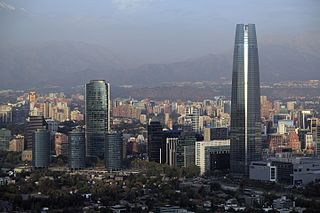
The economy of Chile operates as a market economy and is classified as a high-income economy by the World Bank. It is recognized as one of the most prosperous countries in South America, leading the region in areas such as competitiveness, income per capita, globalization, economic freedom, and low levels of perceived corruption. Despite its prosperity, Chile experiences significant economic inequality, as reflected by its Gini index, though this is close to the regional average. Among Organisation for Economic Co-operation and Development (OECD) countries, Chile has a robust social security system, with social welfare expenditures amounting to approximately 19.6% of GDP.
International trade is the exchange of capital, goods, and services across international borders or territories because there is a need or want of goods or services.

The World Trade Organization (WTO) is an intergovernmental organization headquartered in Geneva, Switzerland that regulates and facilitates international trade. Governments use the organization to establish, revise, and enforce the rules that govern international trade in cooperation with the United Nations System. The WTO is the world's largest international economic organization, with 166 members representing over 98% of global trade and global GDP.
A subsidy, subvention or government incentive is a type of government expenditure for individuals and households, as well as businesses with the aim of stabilizing the economy. It ensures that individuals and households are viable by having access to essential goods and services while giving businesses the opportunity to stay afloat and/or competitive. Subsidies not only promote long term economic stability but also help governments to respond to economic shocks during a recession or in response to unforeseen shocks, such as the COVID-19 pandemic.

Protectionism, sometimes referred to as trade protectionism, is the economic policy of restricting imports from other countries through methods such as tariffs on imported goods, import quotas, and a variety of other government regulations. Proponents argue that protectionist policies shield the producers, businesses, and workers of the import-competing sector in the country from foreign competitors and raise government revenue. Opponents argue that protectionist policies reduce trade, and adversely affect consumers in general as well as the producers and workers in export sectors, both in the country implementing protectionist policies and in the countries against which the protections are implemented.

An agricultural subsidy is a government incentive paid to agribusinesses, agricultural organizations and farms to supplement their income, manage the supply of agricultural commodities, and influence the cost and supply of such commodities.
An export in international trade is a good produced in one country that is sold into another country or a service provided in one country for a national or resident of another country. The seller of such goods or the service provider is an exporter; the foreign buyers is an importer. Services that figure in international trade include financial, accounting and other professional services, tourism, education as well as intellectual property rights.
Trade barriers are government-induced restrictions on international trade. According to the theory of comparative advantage, trade barriers are detrimental to the world economy and decrease overall economic efficiency.

Trade justice is a campaign by non-governmental organisations, plus efforts by other actors, to change the rules and practices of world trade in order to promote fairness. These organizations include consumer groups, trade unions, faith groups, aid agencies and environmental groups.

Non-tariff barriers to trade are trade barriers that restrict imports or exports of goods or services through mechanisms other than the simple imposition of tariffs. Such barriers are subject to controversy and debate, as they may comply with international rules on trade yet serve protectionist purposes.
Trade can be a key factor in economic development. The prudent use of trade can boost a country's development and create absolute gains for the trading partners involved. Trade has been touted as an important tool in the path to development by prominent economists. However trade may not be a panacea for development as important questions surrounding how free trade really is and the harm trade can cause domestic infant industries to come into play.

International economics is concerned with the effects upon economic activity from international differences in productive resources and consumer preferences and the international institutions that affect them. It seeks to explain the patterns and consequences of transactions and interactions between the inhabitants of different countries, including trade, investment and transaction.

In international trade, market access refers to a company's ability to enter a foreign market by selling its goods and services in another country. Market access is not the same as free trade, because market access is normally subject to conditions or requirements, whereas under ideal free trade conditions goods and services can circulate across borders without any barriers to trade. Expanding market access is therefore often a more achievable goal of trade negotiations than achieving free trade.
The Agreement on Agriculture (AoA) is an international treaty of the World Trade Organization. It was negotiated during the Uruguay Round of the General Agreement on Tariffs and Trade, and entered into force with the establishment of the WTO on 1 January 1995.
Trade facilitation looks at how procedures and controls governing the movement of goods across national borders can be improved to reduce associated cost burdens and maximise efficiency while safeguarding legitimate regulatory objectives. Business costs may be a direct function of collecting information and submitting declarations or an indirect consequence of border checks in the form of delays and associated time penalties, forgone business opportunities and reduced competitiveness.
John Sullivan Wilson is a former Lead Economist (retired) of the World Bank. He directed and managed research on transparency, trade facilitation, regulation, and economic development. Mr. Wilson served in the Development Research Group of the World Bank and also in operations in the Infrastructure Vice Presidency.
Trade Costs & Facilitation: The Development Dimension is an ongoing research project on trade facilitation reform carried out by the Development Economics Research Group of the World Bank.
The economic liberalisation in India refers to the series of policy changes aimed at opening up the country's economy to the world, with the objective of making it more market-oriented and consumption-driven. The goal was to expand the role of private and foreign investment, which was seen as a means of achieving economic growth and development. Although some attempts at liberalisation were made in 1966 and the early 1980s, a more thorough liberalisation was initiated in 1991.
An eco-tariff, also known as an environmental tariff, is a trade barrier for the purpose of reducing pollution and improving the environment. These trade barriers may take the form of import or export taxes on products that have a large carbon footprint or are imported from countries with lax environmental regulations. A carbon tariff is a type of eco-tariff.
This article is intended to give an overview of the trade policy of South Korea. In 1945 Korea was liberated from the Empire of Japan at the end of World War II. A destructive drought in 1958 forced Korea to import large amounts of food grains. In 1950, the Korean War broke out, which destroyed more than two-thirds of the nation's production facilities and most of its infrastructure. Trade policy of South Korea has taken many shifts, from import substitution to globalization and there has been significant impact on the economy for the same.







